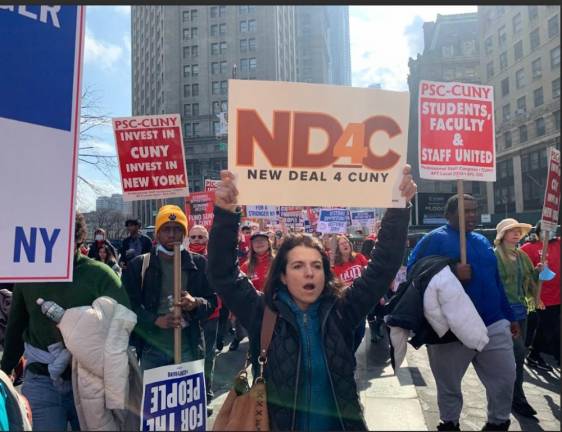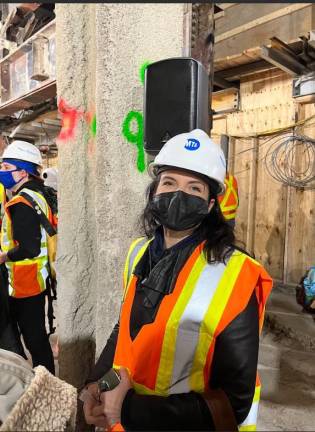Parisian and Longtime CB5 Member Reflects on Activism that Shook Up MSG
Layla Law-Gisiko is a longtime member of Community Board Five and, more recently, the new was tapped as the new president of The City Club, the venerable civic group. But the titles don’t quite capture the force of nature that is Law-Gisiko.


This is the first in a two part series. For Part II, click here.
Born in Paris, French television sent her to New York as a producer in the heady boom times of the 1990’s. She ended up staying, having two kids who are now in college, and using her journalistic skills to master the arcane issues of Manhattan development.
Her kids are native New Yorkers. Layla Law-Gisiko is that other recognizable type of New Yorker, the immigrant more zealous than a native about her adopted hometown.
Let’s start with the remarkable story here, which is that you have become one of the most significant voices on the future of Madison Square Garden and Penn Station. How did that happen?
I think it happened because I happened to be the chair of the land use committee for Community Board five. And also because I really like to get involved. You know, I like to do the work. I like to read the thousands of pages of documents. And this is the perfect opportunity...
You didn’t start out though as a New York civic activist, or even a New Yorker, for that matter.
I was born in France, in Paris, and I came here with two duffel bags 26 years ago, with no particular plan. It was not like life was mapped out. And there were lots of circumstances that brought me where I am. A lot of amazing people who have helped me along the way. One of the most significant being the chair of our board currently, Vikki Barbero, who when I joined the board 18 years ago, really took the time to teach me. And she certainly made me a better person.
18 years, that’s a long time to serve on the community board.
When I look back, and see where I am today. I’m like, I had no clue. I had no clue that this was going to be the journey. It happened. it just unfolded. I didn’t even know that community boards existed... Thank God. I’m a quick study. Here I am.
You sometimes do make comparisons, though, between New York and Paris
It’s a great strength and a great asset to know how things are done elsewhere. And certainly when you’re dealing with infrastructure it’s good to come from Paris. Because we invented the subway, you know? the Metropolitan was invented in Paris. The French have a lot of savoir faire and an expertise in infrastructure. So it comes very, very handy dealing with New York that has actually a lot of similarities with Paris.
Well, you may have invented the subway, but we invented the unexpected and intolerable delay.
Well, the French can be pretty good at that with the strikes. But, yes, the infrastructure here in the Northeast really needs major improvement, that’s for sure.
We had a great example of that just [recently] that broken pipe in Time Square shut the subway down all morning.
Mayor Bloomberg made a point of actually creating a new water main throughout the city. Because up until him, there was only one single point of failure.
That’s an interesting point, because we have a similar situation that relates directly to Penn Station. We have a single point of failure tunnel under the Hudson and the Gateway project will create yet another challenge for you and the others in the community board about the future of a new Penn Station.
Yeah, but the reality is that the tunnel under the Hudson River is much needed, but it is solely a redundancy and resiliency projects. And we need it because single points of failure are just not acceptable, especially in a metropolis like New York..
They’re already talking about how they need to create an expanded Penn Station to absorb the increase.
This is bullshit. And I don’t know if I’m allowed to say bullshit. But it is a bogus argument, the tunnel itself is not going to cause the capacity to increase. You have two tracks in New Jersey, four tunnel [tracks], and then back into Penn Station. Your capacity is limited by your two tracks in New Jersey. You cannot run more trains just because you created a spur.
We’re talking, in part, because this was such a big time in the whole Penn Station saga. Could you tell us what the City Council did and why it was so important?
So on [Aug. 28], the subcommittee, and then the Committee on land use took a vote on the Madison Square Garden special permit. And although the city [via the Planning Commission] had recommended 10 years, the city council scaled it down to five. And it is remarkable, that all together, we would be in the situation where the permit is limited in time. 10 years ago, when the permit was authorized for 10 years, it was miraculous and heroic. So the fact that we are here today, and it was actually scaled back to five years is just incredible. It is really, really historic. I think that five years really sets the pace for what is to come. Five years means that no one can just go back to their business and ignore that there is something pressing. For big, mega infrastructure projects, five years means tomorrow. CB5 had recommended three years. The council went with five years. But it’s okay. It’s not tomorrow morning, it’s tomorrow afternoon...
What are the questions that you see is most central to those negotiations?
Good Faith, and lack of greediness. This is basically the core of what we’re dealing with. And at some point, I think everybody in the end will have a little bit of this gag reflex. And as long as we can live with it. It’s not going to be ideal for anyone...And so long as we keep focused on really what matters. Which is, not tomorrow, it’s not five years, it’s how is the region in 50 years? Are we remaining competitive with Paris and London? Those are the questions...What matters to people. What will matter to our regional economy. You know, New York is the engine of this country and can’t get it wrong.
And so framed that way, what is the outcome that you’d like to see?
I would like to see an infrastructure that allows for a massive capacity and connectivity increase. So that not only we can move more people. We can move them to different parts of the region where currently this connectivity doesn’t exist. This is what is going to be the key. This is what London is doing. Tokyo, Paris, all the metropolises. This is how they have invested in infrastructure. That’s what needs to happen. In order for that to happen. I believe that Madison Square Garden needs to move. If there is a way to actually accomplish that without moving MSG, okay. All right, it may be fine. But really, the key here is a very regional issue, which is an increase in capacity and connectivity for the region.
You are describing what sometimes is summed up in the phrase “through-running?”
Exactly. This is exactly through running. It is a one seat ticket that takes you from Trenton to Montauk. From New Brunswick to Patchogue. Pick your destination. But basically, it is this connectivity that allows an entirely interconnected rail system.
I’m having visions of going from Charles de Gaulle airport to the south suburbs of Paris, which seems like a luxury far beyond anything we could conceive here.
So let me tell you a little story. As you know, I am from France. Next year, I will be able to fly into the smaller Paris airport, Orly [South of Paris] and take the subway. And in 13 minutes, I will be at my parents apartment [in Paris], and there will be zero steps. Everything will be at grade. I will be able to pick up my suitcase from the carousel and get into mom and dad’s apartment without having to go up one step. It’s amazing. 13 minutes. it’s the kind of connectivity that we need. I mean coming back from JFK, if you’re taking the subway, it’s taking you what, two hours? We’re not talking 13 minutes. It’s crazy.
So come back to through running, because this is where I think a lot of people get completely baffled by the situation. Are we doing this backwards. First, we’re deciding whether Madison Square Garden could have a permit to stay. And then later we’ll decide whether to create a system of interconnected railroads that might require Madison Square Garden to move?
I think that’s what this five year permit allows us to do. And during these five years we need to figure out what kind of infrastructure connectivity and capacity increase we’re going to go for.
They can continue to have their concerts and their basketball and hockey and, you know, bull riding and all that good stuff that happens at MSG. Fine. We have five years to figure out what the region should look like in terms of infrastructure, and what do we need for it.
So in other words, these five years are not just to come up with a renovation of the train shed. It’s really to fix the whole commuter experience?
Correct. It is absolutely necessary. And you know, as difficult as it is. As arduous as the road is.
The stars are aligned. We have five years. We have big grants for big infrastructure projects thanks to the bipartisan infrastructure law. We have a commitment and a focus from both MTA and Amtrak, and New Jersey Transit. Let’s do it.